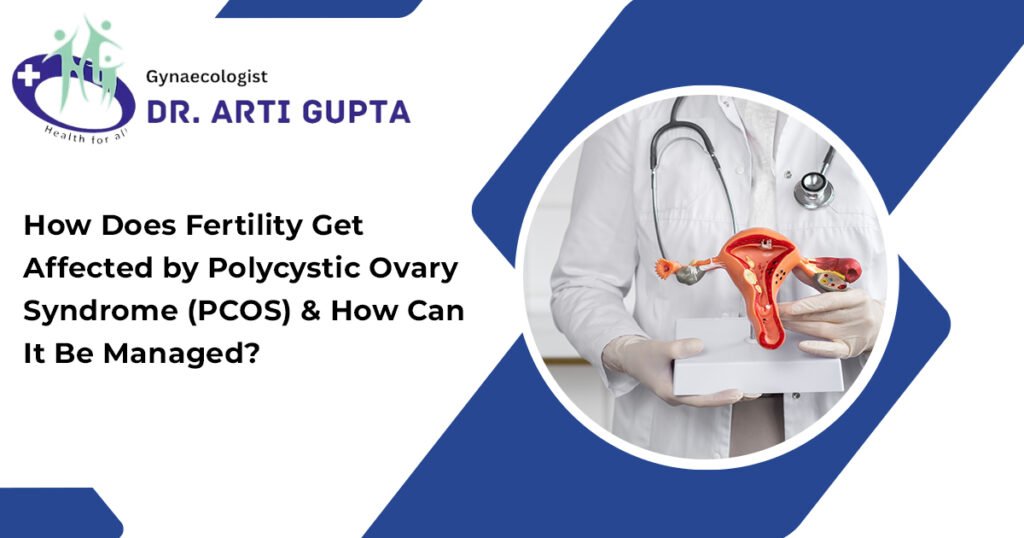Polycystic Ovary Syndrome (PCOS) is a common endocrine disorder that affects millions of women worldwide. One of the significant concerns for women with PCOS is its impact on fertility. Dr. Arti Gupta, a renowned fertility expert, provides valuable insights into how PCOS affects fertility and offers practical management strategies.
Understanding PCOS and Its Impact on Fertility
Hormonal imbalances disrupt the normal functioning of the ovaries in PCOS. Women with PCOS often have elevated levels of androgens (male hormones) and insulin, which can interfere with the menstrual cycle and ovulation. Here are the primary ways in which PCOS affects fertility.
- Irregular Ovulation: One of the hallmark features of PCOS is irregular or absent ovulation. Without regular ovulation, the release of eggs becomes unpredictable, making it difficult to conceive.
- Hormonal Imbalance: Elevated levels of androgens and insulin resistance are common in women with PCOS. These hormonal imbalances can prevent the follicles in the ovaries from maturing properly, further hindering ovulation.
- Insulin Resistance: Insulin resistance is common among women with PCOS, which leads to higher insulin levels. This condition not only contributes to weight gain but also exacerbates hormonal imbalances, affecting fertility.
- Endometrial Health: PCOS can lead to irregular menstrual cycles, which may cause the endometrial lining to become too thick or too thin, creating an inhospitable environment for implantation.
Managing PCOS to Improve Fertility
While PCOS can pose challenges to fertility, effective management strategies can significantly improve the chances of conception. Dr. Arti Gupta emphasizes a comprehensive approach that includes lifestyle modifications, medical treatments, and assisted reproductive technologies (ART) when necessary.
➽ Lifestyle Modifications
- Healthy Diet: Adopting a balanced diet rich in whole grains, lean proteins, and healthy fats can help manage insulin levels and promote weight loss.
- Regular Exercise: Physical activity can improve insulin sensitivity, regulate menstrual cycles, and enhance overall well-being.
- Weight Management: Losing even a small percentage of body weight can have a significant positive impact on ovulation and fertility.
➽ Medical Treatments
- Medications for Ovulation Induction: Drugs such as clomiphene citrate or letrozole can stimulate ovulation in women with PCOS.
- Insulin-Sensitizing Agents: Metformin is commonly prescribed to improve insulin sensitivity and regulate menstrual cycles.
- Hormonal Treatments: Anti-androgen medications may be used to manage hormonal imbalances.
➽ Assisted Reproductive Technologies (ART)
- Intrauterine Insemination (IUI): This procedure involves placing sperm directly into the uterus to facilitate fertilization.
- In Vitro Fertilization (IVF): IVF is a highly effective ART option for women with PCOS who have not responded to other treatments. The process involves fertilizing an egg outside the body and implanting the embryo inside the uterus.
The Role of a Fertility Expert
Consulting a fertility expert like Dr. Arti Gupta can provide personalized guidance and support for women with PCOS. A fertility specialist can perform a thorough evaluation, recommend appropriate treatments, and monitor progress to optimize fertility outcomes.
Conclusion
PCOS is a complex condition that can significantly impact fertility, but with proper management, many women with PCOS can achieve their dream of parenthood. Through lifestyle changes, medical interventions, and the expertise of fertility specialists like Dr. Arti Gupta, women with PCOS can improve their chances of conceiving and maintaining a healthy pregnancy.
- Our Blogs

